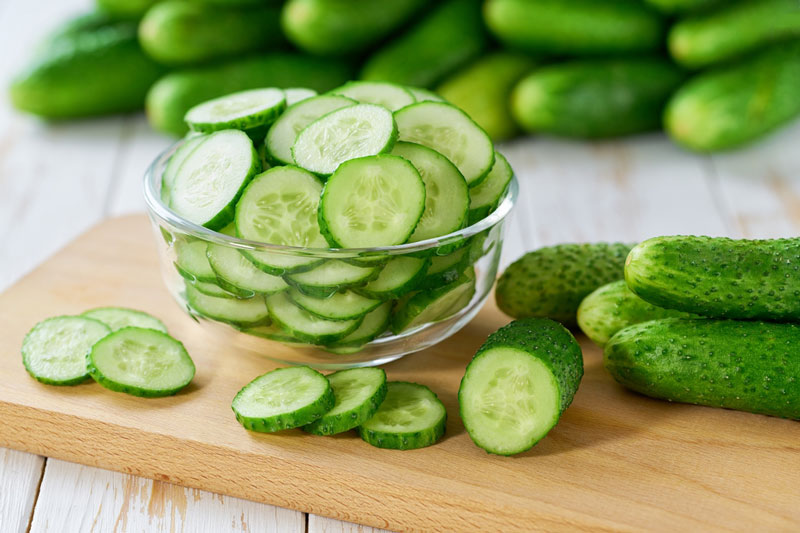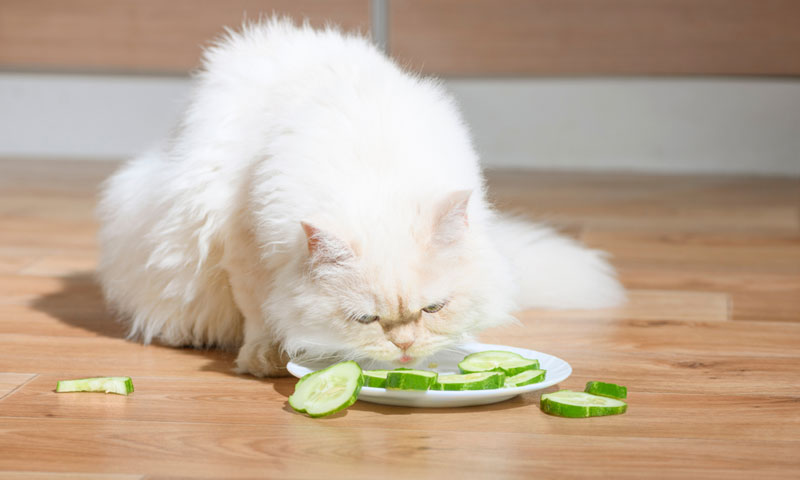Have you ever thought about what kind of snacks our feline friends can munch on? Well, the question of whether cats can eat cucumbers is a valid one! Yes, they can, but with a few important things to remember. Some cats might find cucumbers interesting while others may not show any interest at all. So, let’s take a closer look and uncover the truth behind this crunchy green veggie.
It’s quite fascinating to think about our pets’ diets, especially when it comes to the foods we enjoy. Cats, primarily carnivorous, need a protein-rich diet; however, the crunchiness of cucumbers can still be a curious addition to their meals. These little green guys might even pique their curiosity, and some cats would appreciate the texture. However, it’s super important to know how to introduce new foods carefully.
So, if you’re eager to learn more about cucumbers and how they fit into your cat’s diet, stay with us! We’ll explore the different aspects to consider, from benefits to risks, and more. It’s going to be an exciting adventure in the world of feline-friendly foods!
You might also be interested in: Can Cats Eat Guava?
Can Cats Eat Cucumbers?

Our feline companions can indeed nibble on cucumbers without experiencing harm. These refreshing veggies can provide a different texture and are extremely low in calories. However, it’s important to mention that while some cats may enjoy chomping down on cucumbers, others may have absolutely no interest. Just like humans, every cat has its unique taste preferences. Just because it’s edible doesn’t mean they will love it! If you’re thinking of introducing this snack, always start small to see how they react.
Let’s not overlook the fact that cucumbers are mostly made up of water—about 95% of it, to be precise! This can help keep your cat hydrated, especially during those hot summer days. But remember, cats don’t require vegetables in their diet as they mainly thrive on meat. So, it’s not a necessary part of their meals. They are obligate carnivores, which means they need nutrients from animal sources to stay healthy. So if you’re sharing cucumbers as a treat, consider it more as a fun experiment than a staple of their diet.
How Much Cucumbers Can Cats Eat?
When it comes to sharing cucumbers with your cat, moderation is key! Cats should only have a few small slices of this veggie treat at a time to ensure that they do not overindulge. Offering a small hunk, about an inch or two, is a safe and reasonable portion. The goal is to introduce variety in their diet while keeping it safe and healthy.
We also need to remember that not every kitty will want to try this crunchy treat. Some cats might take a nibble and turn their nose up at it afterward! This is perfectly natural—let’s face it, not everyone loves cucumbers! So, if your cat doesn’t show an interest, it’s best to respect their preferences and try different cat-safe fruits or veggies.
Another helpful tip is to always wash the cucumber thoroughly. Cats don’t need pesticide or dirt exposure, and we definitely want to keep their treats as clean as possible. If you want to help your kitty enjoy cucumbers, consider cutting them into small bite-sized pieces or even including them in their regular meals as a garnish! Remember, the portion size and method of preparation can help enhance the experience.
But hold on, we should bear in mind that cucumbers should never replace their primary food sources! We want to ensure that our kitties are getting a balanced diet filled with proteins, vitamins, and minerals essential for their health. Treats, such as cucumbers, should remain just that—treats; they shouldn’t overshadow their main meals.
In wrapping up this section, if your cat enjoys cucumbers, feel free to offer them occasionally, but let’s ensure it’s within the safe limits. Moderation will keep their tummy happy and healthy, preventing any digestive upset. Always observe how your cat reacts and adjust accordingly, just like we would with our own snacks!
Benefits Of Cucumbers To Cats
1. Hydration: Cucumbers contain abundant water content, which can help keep our kitty cats hydrated. Although cats might not be huge water drinkers, having a slice or two of cucumber can encourage them to consume more fluids. It’s a fun way to add some hydration to their lifestyle!
2. Crunchy Texture: For many cats, a little crunch can be exciting! The crispness of a cucumber can engage your cat’s natural curiosity. This chewiness may provide some mental stimulation, making snack time enjoyable and fun.
3. Low Calorie: If we’re keeping an eye on our cats’ weight, cucumbers are a fantastic snack to consider. These veggies are low in calories, allowing our furry friends to enjoy a treat without the associated weight gain that other snacks could bring.
4. Variety in Diet: Introducing new foods can prevent meal monotony. Sometimes, cats can become picky eaters, and by including cucumber, we provide a new flavor and texture experience! Changing things up once in a while can spark joy in their dining experiences.
5. Nutrient Boost: While cucumbers aren’t packed with nutrients to sustain cats fully, they do contain small amounts of vitamins and minerals, like vitamin K and potassium. These can play a role in supporting overall health, especially when paired with their main protein-rich meals.
Dangers Of Feeding Cucumbers To Cats
Even though cucumbers can be a safe snack for cats, we should be aware of possible risks associated with feeding them to our furry friends. It’s vital to monitor how they react when first trying cucumbers and be on the lookout for any unusual signs.
One major risk is potential digestive upset. Cats’ stomachs may not handle sudden changes in their diet well, even with a generally safe food like cucumber. If you notice any vomiting or diarrhea after your cat nibbles on some cucumber, it would be best to cease offering it further.
Another aspect to consider is choking hazards. If cucumbers are not cut into small, manageable pieces, the risk of choking increases. Cats, being curious creatures, don’t always chew properly before swallowing, especially if they find themselves in a playful mood. To prevent choking, we should always cut cucumbers into tiny, bite-sized portions before offering them to our pets.
In addition, there may be some cats that simply do not like the taste or texture of cucumbers. If your kitty snubs their nose at it, that’s okay! Let’s remember, cats are individuals, and they often have strong opinions on what they want to eat! Ultimately, trying to force cucumbers on a cat can be more stressful for them than beneficial.
Additionally, as we mentioned earlier, it’s unlikely that cucumbers can provide significant nutrition for cats. While being a fun treat, they can’t replace meat in their diets, which is essential for their overall health and well-being. So while cucumbers may be okay in moderation, they definitely should not be a substitute for their main food source.
Lastly, if your cucumbers come from a grocery store or market, they could have pesticides or chemicals on their surface. It’s crucial to wash them thoroughly before offering them to your cat. If you’re unsure about safety, it’s often best to abstain or consult your veterinarian.
Substitute Of Cucumbers For Cats
1. Zucchini: Another veggie option! Zucchini can be a great substitutable treat for cats, also offering a crunchy texture while being low in calories. Just like cucumbers, they should be cut into small pieces to prevent choking hazards.
2. Carrots: Some cats enjoy munching on baby carrots or thin slices of regular carrots. These can add a crunch to their diet while providing some necessary vitamins! It’s important to either cook or cut them adequately to prevent choking.
3. Peas: These little green nuggets can be a delightful new texture for our feline friends too! Cooked or even frozen peas can offer a fun alternative while also ensuring a fresh flavor in their treat options.
4. Green Beans: For a little greenery, green beans can also serve as a crunchy, low-calorie alternative that many cats may enjoy. We can offer them either cooked or fresh, depending on what your kitty prefers!
5. Apples: If we’re looking to explore fruits, small pieces of apple without the seeds can entice some cats! The sweetness and texture could be appealing, but always keep an eye on how your cat reacts to any new food introduced to them!
Can Cats Eat Cucumbers? Frequently Asked Questions
Can Cucumbers Harm Cats?
Generally, cucumbers are safe for cats when given in moderation. The main concerns revolve around how they might react to these veggies. Monitor closely and avoid feeding excessive amounts. If your cat shows signs of distress, it’s wise to discontinue their offering.
Can I Give My Cat Pickles?
Pickles are not a suitable snack for cats. The high sodium content and seasoning in pickles can pose dangers to their health. Stick to plain cucumbers for a safe crunchy treat!
What If My Cat Doesn’t Like Cucumbers?
No worries! Cats can be picky eaters, and that’s just part of their charm. If cucumbers aren’t appealing to them, there are plenty of other treats to explore. Focus on healthy snacks they enjoy!
How Do I Know If My Cat Can Eat Cucumbers?
Start with small pieces and observe their reaction. If they show interest and enjoy the taste, feel free to add it occasionally as a treat. If they dislike it or show signs of digestive discomfort, it’s best to refrain from offering cucumbers in the future.
Are There Any Vegetables Cats Should Avoid?
Absolutely! Some veggies can be harmful to cats. For example, onions, garlic, and mushrooms can be toxic. Always research any food before sharing it with your felines to ensure their safety!
Final Thoughts
As pet owners, we love experimenting with new snacks to complement our cats’ diets, and cucumbers can certainly be an exciting treat for some! Let’s focus on moderation, preparation, and observing how our furry companions respond. This ensures we keep mealtime engaging and healthy while strengthening the bond we share with our cats.
If you’re interested in exploring even more topics, check out our blog for handy tips and insights about pet nutrition here. Or, if you have questions about feline-friendly foods, like Onions has effect on cats, dive into what happens here. We will continue to learn and grow together in keeping our pets happy and healthy!


